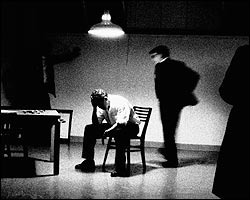Jefferson Bass's Blog, page 2
May 7, 2012
Confronting Evil -- Fictional and Real -- in the City of the Popes
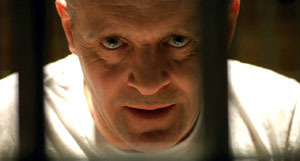 Talking about ancient and modern villains over at the Indigo Blog, specifically the villains of The Inquisitor's Key, and how -- long after Jon's preacher-boy days -- those villains roused questions in his mind about the true nature of good and evil.
Talking about ancient and modern villains over at the Indigo Blog, specifically the villains of The Inquisitor's Key, and how -- long after Jon's preacher-boy days -- those villains roused questions in his mind about the true nature of good and evil.Question: Who are your favorite literary villains of all time?
Published on May 07, 2012 08:21
May 5, 2012
Stabbed ribs, barbecued bodies, and other forensic adventures
The "Inquisi-Key" blog-tour bus has stopped by Susanne Drazic's blog Putting Words on Paper, and Jon's reminiscing about lunch with Dr. Bill Bass at a Knoxville barbecue restaurant. While chowing down on ribs, the two men discussed murder cases and forensic anthropology -- normal lunch-table conversation, sure.
Go on over and read all about it right here. The bus is almost gassed-up and ready to head out.
Go on over and read all about it right here. The bus is almost gassed-up and ready to head out.
Published on May 05, 2012 10:46
May 2, 2012
Book Giveaway: "The Inquisitor's Key"
As Inspector René Descartes would say, “Bonjour, mes amis!” … I’m not exactly certain what he’d say next—it’s been too long since the glory days of researching The Inquisitor’s Key in Avignon! & even longer since high school French with Mademoiselle LaFlamme (oh la la, those mini-jupesshe wore). But I digress … I always digress …
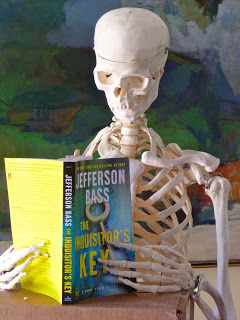 Lemme guess: You’re not here solely to admire my stunning good looks in the photo on the left. You’re also here for the giveaway contest! Good timing. In anticipation of the May 8, 2012 release of The Inquisitor’s Key, I’m sponsoring a giveaway of the new novel to reward each and every one of you who downloaded and read the e-story prequel entitled Madonna and Corpse. We hope you had as much fun reading it as I did—well, honestly—when I pressed SAVE for the last time, then stood up feeling accomplished and went to get a cold beer from the fridge. (Sure, I said it: I, Mr. Bones, actually write all the novels, not Jon and Bill! They just sat back and drank all the beer in my fridge, apparently. Just as well...I don’t have the stomach for alcohol these days. Seems to go right through me…)
Lemme guess: You’re not here solely to admire my stunning good looks in the photo on the left. You’re also here for the giveaway contest! Good timing. In anticipation of the May 8, 2012 release of The Inquisitor’s Key, I’m sponsoring a giveaway of the new novel to reward each and every one of you who downloaded and read the e-story prequel entitled Madonna and Corpse. We hope you had as much fun reading it as I did—well, honestly—when I pressed SAVE for the last time, then stood up feeling accomplished and went to get a cold beer from the fridge. (Sure, I said it: I, Mr. Bones, actually write all the novels, not Jon and Bill! They just sat back and drank all the beer in my fridge, apparently. Just as well...I don’t have the stomach for alcohol these days. Seems to go right through me…)Now wait a minute. I sense that some of you are thinking, “I haven’t downloaded and read Madonna and Corpse, but I want to win The Inquisitor’s Key!” Wait a doggone minute. If you have not already downloaded and read Madonna and Corpse, do NOT go bananas. I’ve come up with a two-step plan to remedy this situation and thus save yourself from a complete breakdown. Click the following link to download Madonna and Corpse (99 cents – how can you lose?!?) from the e-retailer of your choice.Start reading!
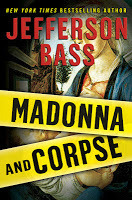
Pretty simple, right?(If you don't own an e-reader, once again do NOT go bananas. You can download this free Kindle app for your PC & read Madonna and Corpse right on your home computer!)
Below you’ll find the questions for this literary treasure hunt. Read Madonna and Corpse, find the correct answers, then email your answers to JeffersonBassBookGiveaway@hotmail.com. We’ll choose the winners on May 7, 2012.
But wait! You can also score extra points! These points will be factored in when we choose the winners. Wanna know how to score?
Share the Jefferson Bass Facebook pageon your Facebook Wall & ask—no—command your friends to LIKE us.Follow @Jefferson_Basson Twitter.Write a review of Madonna and Corpse on Amazon ! (Or any other Body Farm novel!) Leave a comment on the guest blogs we’re posting on our Blog Tour 2012! For instance, this one from today. Go to the actual blog itself and post a comment!
The Questions
What did the thief/thieves steal? What couple does Descartes describe as possessing “movie-star good looks”? How long ago was it that Dubois “bought the farm”? Rumor has it that Kensington’s net profit from the sale of the three unsigned Caravaggio studies was how much? Who is Jack Woods? What sort of new case will Descartes soon be working on? Are you excited about The Inquisitor’s Key!?!
Thanks for playing along. We'll choose the winners on May 7, 2012. Good luck & Happy Reading!
Published on May 02, 2012 17:26
From Limbo with Love
The blog-tour bus has arrived at Poe's Deadly Daughters.
- A few years ago I complained to a friend – an old, wise friend – that I felt myself at a crossroads, unsure which direction to head. I was utterly in limbo, I told him – and I really hated the limbo. He listened, then he was quiet for a minute; finally he said, “You’re in the place of not-knowing, and you need to hang out there for awhile.”
Continue reading at Poe's Deadly Daughters.
- A few years ago I complained to a friend – an old, wise friend – that I felt myself at a crossroads, unsure which direction to head. I was utterly in limbo, I told him – and I really hated the limbo. He listened, then he was quiet for a minute; finally he said, “You’re in the place of not-knowing, and you need to hang out there for awhile.”
Continue reading at Poe's Deadly Daughters.
Published on May 02, 2012 11:25
April 29, 2012
Talking Shop: Plan A, Plan Be, Plan See
Today, Jon's talking shop -- three tricks he's learned about writing novels while writing novels -- over at Elise VanCise's blog Gladiator's Pen.
- I have writer friends whose workspaces are immaculate. I have friends who write every day, including one who gets up at 5:30 a.m. and writes for two hours before heading to his day job as a lawyer. I have friends who make detailed outlines. I have friends who start at the beginning and write their way forward, in perfect linearity, to the end. That is to say, I have friends who are neater, more disciplined, better organized, and generally much smarter than I am! ...
Continue reading at Gladiator's Pen.
- I have writer friends whose workspaces are immaculate. I have friends who write every day, including one who gets up at 5:30 a.m. and writes for two hours before heading to his day job as a lawyer. I have friends who make detailed outlines. I have friends who start at the beginning and write their way forward, in perfect linearity, to the end. That is to say, I have friends who are neater, more disciplined, better organized, and generally much smarter than I am! ...
Continue reading at Gladiator's Pen.
Published on April 29, 2012 11:22
April 25, 2012
Writerhead
Published on April 25, 2012 11:18
April 24, 2012
Putting Faces on the Dead
We're back in the U.S...back in the U.S. of A. for this post over at crime writer Jen J. Danna's blog Skeleton Keys. Along with this forensics-related post, we're releasing an exclusive excerpt from The Inquisitor's Key.
-One of the hallmarks of the Body Farm novels is that the fiction incorporates realistic and detailed forensic techniques. The new book, The Inquisitor’s Key, is no exception. One of the techniques that’s used is radiocarbon dating—also called carbon-14 dating, or C-14 dating...
Continue reading at Skeleton Keys.
-One of the hallmarks of the Body Farm novels is that the fiction incorporates realistic and detailed forensic techniques. The new book, The Inquisitor’s Key, is no exception. One of the techniques that’s used is radiocarbon dating—also called carbon-14 dating, or C-14 dating...
Continue reading at Skeleton Keys.
Published on April 24, 2012 11:15
April 23, 2012
E-Publishing, Take 1: An e-story excerpt from "Madonna and Corpse," and a book giveaway!
A few months ago, my editor asked if I’d consider writing an original short story—something connected to The Inquisitor’s Key in some way. The story would be published electronically (for Kindle, Nook, and iPad/iPhone readers) shortly before the book’s pub date, to help build reader interest. It sounded interesting, so I said “sure!” and starting writing. The resulting e-story—“Madonna and Corpse”—is a “prequel” to the novel. Set in Avignon, France, it stars the French detective, Inspector René Descartes, working a baffling art-forgery case just before his world collides with that of the book’s heroes, Dr. Bill Brockton and Miranda Lovelady. Here’s the beginning of Madonna and Corpse; if you like this sneak peek, please download the e-story (99 cents – how can you lose?!?) and you could win a free signed copy of The Inquisitor’s Key. The giveaway quiz-contest will be open to everyone who downloads/reads Madonna and Corpse and emails us correct answers to the quiz questions. Questions will be posted on Wednesday, April 25, so start reading! (If you don't own an e-reader, don't lose hope. You can download this free Kindle app for your PC & read the Madonna and Corpse right on your home computer!)
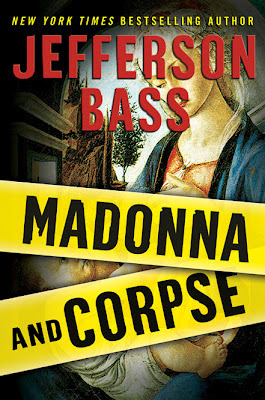
Madonna and Corpse
The Petit Palais MuseumAvignon, France
1: Descartes
“Turn off that damned alarm!” René Descartes—Inspector René Descartes, of the French National Police—waved his arm in a sweeping arc of annoyance that encompassed not just the bored police officers and the nervous museum staffers, but also the museum itself, its collection of ancient paintings, and possibly even their long-dead creators, as if the artists themselves might bear some of the blame for rousting him from sleep at one in the morning.
“We’re working on it,” croaked the museum’s director, a withered crone named Madame Clergue. Christ, how old is she? wondered Descartes, jotting her name in a pocket-sized notepad that he’d fished from inside his jacket. She probably bought these pictures from the guys who painted them. Beneath her hastily donned raincoat, Mme. Clergue appeared to be wearing only a thin cotton nightgown. Its embroidered collar was unraveling, sending tendrils of thread curling upward toward her wispywhite hair.
Unlike Mme. Clergue, Descartes was fully decked out in his de facto professional uniform—dress pants, dress shirt, jacket and tie–not because he’d swiftly suited up when the dispatcher awoke him, but because he’d fallen asleep on the couch at eleven, still wearing the rumpled outfit he’d donned fifteen hours before. Somehow this had become his nightly ritual of late: nursing a few beers or a bottle of wine in front of the television until the news or soccer highlights lulled him to sleep. As a result, his dreams often hitched themselves to the sirens and shrieks emanating from the television, creating the odd sensation that he’d not actually fallen asleep, but had simply switched to a channel specializing in French surrealism. As the museum’s alarm continued to jangle mercilessly, Descartes wondered if this, too, might simply be another of those dreams, conjured up to explain a particularly clamorous sound track.
Just as he could bear no more, the alarm ceased. Its clang echoed for several seconds in the stone corridors and stairwells of the vast structure. In the acoustic void left behind, the silence seemed as close and dense as fog until Descartes spoke, dispersing it. “And you’re quite sure it’s not a false alarm, Madame?”
Mme. Clergue nodded vigorously for a woman of her years. “Quite sure. Pascal”—she stretched a claw-like finger toward a uniformed guard hovering in a nearby doorway—“found the door propped open at the service entrance.” At the mention of his name, Pascal, who managed to look as self-important as a key witness yet also as sheepish as a guard who’s been robbed, approached the director and murmured in her ear. She blanched, then said to Descartes, “If you wish to see the security-camera footage of the thief, Pascal has it on the monitor.”
“Sure, let’s take a look.” The inspector followed Pascal and Mme. Clergue through a doorway into a small, windowless room located just off the entry hall. Arrayed above a low, desk-like counter that lined one wall, an appliance-store-worth of small televisions showed video feeds from a fleet of cameras. Three of the cameras monitored exterior doorways—the museum’s main entrance, a large loading-dock door, and an emergency exit—and the others offered wide-angle views of the museum’s galleries. At the center of the cluster, a larger monitor featured a zoomed-in view of the loading-dock door, propped open with a stone block. A man, frozen in mid-step, was emerging from the building. Pascal stooped and snaked an arm between Descartes and Mme. Clergue to press a button on the console; on the screen, the door opened wide and the man exited the building.
Descartes leaned in for a closer look. As he did, he inadvertently collided with Mme. Clergue, who was likewise angling for a better view. “Excuse me,” she squawked. It was an accusation, not an apology, and Descartes ignored it.
The man on the screen was wearing black: black shoes, black pants, black pullover, black cap. His head was bowed and as he emerged fully onto the loading dock, he wrapped one arm across his face and then turned away from the camera. “He knows where the camera is,” Descartes said to Mme Clergue. “Could he be one of your staff?” Using a wooden crate for a boost, the man scaled a gate and dropped into a quiet street on the other side. To Pascal, the detective said, “Back up. Let’s watch that again.”
Mme. Clergue pursed her lips and shrugged, then drew a deep breath and puffed it out, pphhtt, in answer to Descartes’s question. “From this picture, who can tell? Nine men—ten, if you count the gardener—work at the museum. One is as fat as a pig, so it’s not him.” Descartes heard Pascal suppress a snicker. “One is tall enough to be an American basketball player; another could be a circus midget. I suppose it could be any of the others.” She frowned at the screen as the man re-emerged once more in playback, then turned and frowned at Descartes, her pale eyes raking him up and down. “But it could be anyone. It could be you, Inspector.”
Descartes raised his eyebrows at her. “You missed your true calling, Madame Director,” he said drily. “You should have been a detective.” He gestured at the monitor. “So, with your keen powers of observation, what other helpful deductions can you share with us?”
His sarcasm brought a flush to her cheeks and a flash to her eyes, but she dutifully studied the screen once more. Finally, sighing, she said, “I deduce that we should hide our security cameras in the bushes, so the robbers won’t know where they are.”
Descartes laughed, his irritation unexpectedly dispersed by the dry, self-deprecating joke. “Touché, Madame.” After a pause he added kindly, “Also, perhaps it’s worth noting that the man’s hands are empty?”
She drew a sharp breath, staring at the screen. “Then he’s not stolen anything? Oh, thank God!” She breathed deeply in relief.
“Well, he hasn’t stolen everything, at any rate,” the detective hedged. “Does the collection include jewelry? Gold? Gems? Other small, precious things he might have put in his pockets?”
She pursed her lips, taking mental inventory, then shook her head. “Our specialty is medieval and Renaissance paintings. We do have some artifacts, but mostly sculptures and architectural fragments—the tops of columns, effigies from tombs, that sort of thing. Nothing of much value. Certainly nothing pocket-sized.”
Descartes tapped the figure frozen once more on the screen. “Could there be a painting under his shirt? Or rolled up in the leg of his pants? Something he’s cut from the frame and tucked in his clothes?”
“Heavens, Inspector,” she sighed, “just when I’m beginning to find you reassuring, you pull the rug out from under me again.” She put a hand to her chin, a yellow, hornlike fingernail stroking thin lips as she pondered. “We have a number of small paintings. The only way to know is to check all the galleries. Shall I go and get started?”
“Not yet.” Descartes turned to the security guard, who had rolled his chair away from the counter in search of more personal space. “Pascal, can you scroll through the footage from the galleries? Starting when the alarm sounded, and going backward?”
“Of course.” The guard rolled toward the console again, parting the inspector and the director. “Starting with Gallery 1?”
The inspector turned to Mme. Clergue. “Let’s think like a thief, shall we? What’s the most valuable painting in the museum, and how much is it worth?”
“Goodness, that’s a difficult question, Inspector,” she replied. “Most of our paintings were donated or loaned to us years ago, so it’s hard to say what they might fetch these days. Take that piece, for instance.” She turned and pointed through the security room’s doorway at a picture suspended from the ceiling of the entry hall—a large portrait of a couple standing side by side. “Mary Magdalene and John the Baptist. That’s just an enlargement, of course. We paid sixty thousand francs for the painting, thirty years ago. Earlier this year, a work not nearlythat good fetched three million euros at auction.”
“Three million, eh?” Descartes studied the painting with growing interest. The colors were vivid and vibrant, and the couple possessed movie-star good looks—sex appeal, even, he was surprised to notice. “But I thought you specialized in medieval art,” he said. “Surely that’s more modern?”
She gave him a tolerant smile. “Actually, it’s six hundred years old,” she said. “But it looks almost contemporary, doesn’t it? Not the pinched, anemic figures you see in most medieval paintings.”
“For a religious painting, that’s pretty sexy,” Descartes remarked. “Which gallery is that one in?”
“Six,” the director said. Even before she said it, Pascal had switched the main monitor to the Gallery 6 camera. He scrolled backward rapidly, the minutes in the time-stamp box spinning down as fast as seconds.
“Stop,” Descartes ordered. A shadow had flitted across the screen, so swiftly as to be almost invisible. “Go forward, Pascal. Not so fast.” The guard reversed the direction of the playback. “There! Slow down, slow down!” A man entered the gallery, then turned toward the camera so that his face was clearly visible. “Damn,” said Descartes.
“Sorry,” Pascal shrugged. “Just me, making my rounds.”
“Okay. Scroll back the rest of the way. All the way to closing time.”
Pascal made two more cameo appearances on screen, each time turning to face the camera. Otherwise the room remained empty except for the sundry saints and martyrs lining the walls.
Descartes turned to Mme. Clergue. “So what else might be especially tempting to an art thief?”
Pphhtt, she puffed again, shrugging. “We all have our own tastes.”
He cocked his head quizzically. “And what’s your taste? What would you steal, Madame?” She drew back, shocked, and searched his eyes for signs of accusation. He smiled and winked. “Me, I’d steal the sexy couple.”
She flushed slightly, a faint pink suffusing the parchment of her cheeks, but her eyes twinkled. “Oh dear me,” she fluttered. “Well, if I were shopping for my personal collection, I, too, might take the … the couple that you like. But if I were hoping to sell it on the black market, I’d go for name recognition and pinch the Botticelli.”
Descartes’s eyebrows shot up. “Botticelli? The guy who painted Venus on the half-shell?”
“Really, Inspector, have you no respect?” She made a piping sound that might have been either a wheeze or a giggle. “Yes, Botticelli was the guy—the artist—who painted ‘The Birth of Venus.’ We have—I hopewe still have—a lovely ‘Madonna and Child’ by Botticelli. In Gallery 11.”
The guard was already on it. He’d barely begun to scroll backward when the screen flickered with motion. He stopped scrolling and reversed direction. For the fourth time, they watched as Pascal entered a gallery, faced the camera, and then strolled out of frame. Seconds later, though, he ran back in and—without slowing down or looking at the camera—sprinted out the doorway he’d originally entered. “That’s when I heard the alarm,” he explained. He pointed to the time stamp on the screen. “Twelve-oh-eight a.m.”
Descartes consulted his notepad. “Yes, that’s when we got the signal,” he said. He chewed on his lower lip. “Do you have a floor plan of the museum?” Pascal tapped the counter; pressed beneath a glass top was a diagram of each level. The detective studied it, then pointed with the tip of his pen. “So when you heard the alarm, you were here. Where were you just before that?”
“Directly above, in Gallery 12,” the guard answered. “The top floor. I came down the spiral staircase”—he indicated the stairs on the map—“and went through Gallery 11. When the alarm sounded, I ran back to the stairs and came down here, to see which alarm sensor had gone off.” He pointed to a bank of indicator lights—a row of steady green LEDs, broken by one blinking red diode.
Descartes nodded. “Okay. The video. Keep scrolling backward, please.” Pascal resumed, but he’d barely gotten beyond his own 12:08 appearances before another shadowy figure began darting across the frame. Pascal twitched the knob on the control panel. The video slowed, just in time to show the black-clad man walking out of the gallery. He was carrying a painting, and for a moment, as he passed through the wide doorway, the upper right corner of the picture was visible. It showed the delicate face of a beautiful girl, who appeared to be looking down at the man abducting her.
Mme. Clergue gasped and clutched Descartes’s sleeve. “Oh dear God,” she whispered. “I think he’s got the Botticelli.”
Descartes tapped Pascal on the shoulder. “Go back. Play the whole thing in real time, start to finish.” The guard nodded and pressed a button. After a few seconds, the black-clad man entered the screen, moving in reverse, hugging the young woman to his chest. “No, no,” Descartes snapped. “Forward, forward. Start at the beginning and go forward.”
“I am going forward,” Pascal protested.
“Then why the hell is he moving backward?”
The guard shrugged. “I don’t know why, but he is,” he insisted. He tapped the corner of the screen. Sure enough, the time-stamp numbers were spinning up, second by second. “See?”
“I don’t understand,” Mme. Clergue fretted.
“He doesn’t want to show his face,” Descartes said. “Maybe he’s teasing us, too, knowing we’ll be watching. In any case, he knows where all the cameras are. He must be an insider.” Mme. Clergue started to protest, but the inspector raised a hand for silence. They watched with growing puzzlement as the man stopped and leaned the painting against the wall, fished an implement of some sort from his pants, and struck the wall three times. Then, to their utter astonishment, he hoisted the painting from the floor, hung it, and strode from the gallery.
There was a moment of stunned silence, broken by a single bark of laughter from Descartes. “I’ll be damned,” he said. “He’s not looting your collection; he’s adding to it!”
“This is very …” Mme. Clergue began vaguely, but Descartes was already out the door, moving at a ponderous, middle-aged jog toward the spiral stairs. When Mme. Clergue caught up, he was in the middle of Gallery 11 staring at the wall. Hanging directly in front of him, where it had hung for years, was Botticelli’s “Madonna and Child.” Hanging alongside it was … Botticelli’s “Madonna and Child.”
THANKS FOR READING. WE HOPE YOU ENJOYED THIS FREE EXCERPT OF “MADONNA AND CORPSE." IF YOU DID, SHARE IT WITH FRIENDS—AND PLEASE DOWNLOAD THE E-STORY. GET READY TO WIN A COPY OF "THE INQUISITOR"S KEY"!
Published on April 23, 2012 20:34
April 20, 2012
The Knights Templar and the Body Farm
Today, the blog-tour bus goes amphibious as Jon heads across the (virtual) pond to chat with the folks at Shots - Crime & Thriller E-Zine about weaving together the Knights Templar and the Body Farm.
Published on April 20, 2012 11:07
April 17, 2012
Fact/Fiction: The beautifully blurry line
Today, the blog-tour bus skidded to a stop at Janice Bashman's blog The Writing Life, and I'm talking about the blurry line between fact & fiction -- in writing, life, and religion.
Here's a taste:
-Writing The Inquisitor's Key – a crime novel set in France – required a research trip to Avignon, a walled city in Provence, nestled in a bend of the Rhone River. The task loomed, daunting, even overwhelming – all those wines! all that cheese! – but someone had to do it, right? So in May 2011, I dusted off my passport, packed my French phrase book (“La toilette?”), and headed off for a grueling week. Seriously, folks: authentic forensic detail and meticulous research are trademarks of the Body Farm novels, so I had to go. Really I did...
Read the rest of the article at The Writing Life.
Here's a taste:
-Writing The Inquisitor's Key – a crime novel set in France – required a research trip to Avignon, a walled city in Provence, nestled in a bend of the Rhone River. The task loomed, daunting, even overwhelming – all those wines! all that cheese! – but someone had to do it, right? So in May 2011, I dusted off my passport, packed my French phrase book (“La toilette?”), and headed off for a grueling week. Seriously, folks: authentic forensic detail and meticulous research are trademarks of the Body Farm novels, so I had to go. Really I did...
Read the rest of the article at The Writing Life.
Published on April 17, 2012 10:59
Jefferson Bass's Blog
- Jefferson Bass's profile
- 1155 followers
Jefferson Bass isn't a Goodreads Author
(yet),
but they
do have a blog,
so here are some recent posts imported from
their feed.


